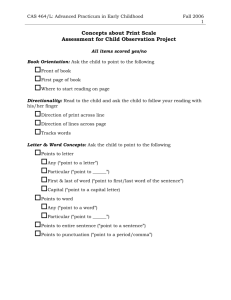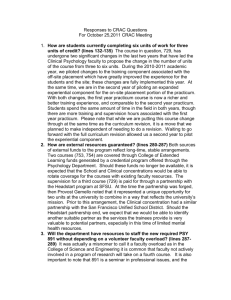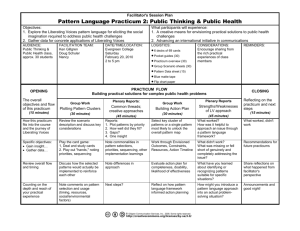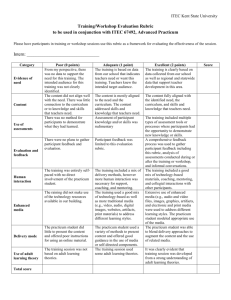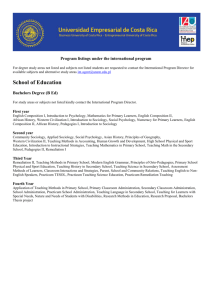Psychology 873 Community Research and Action Practicum Spring
advertisement
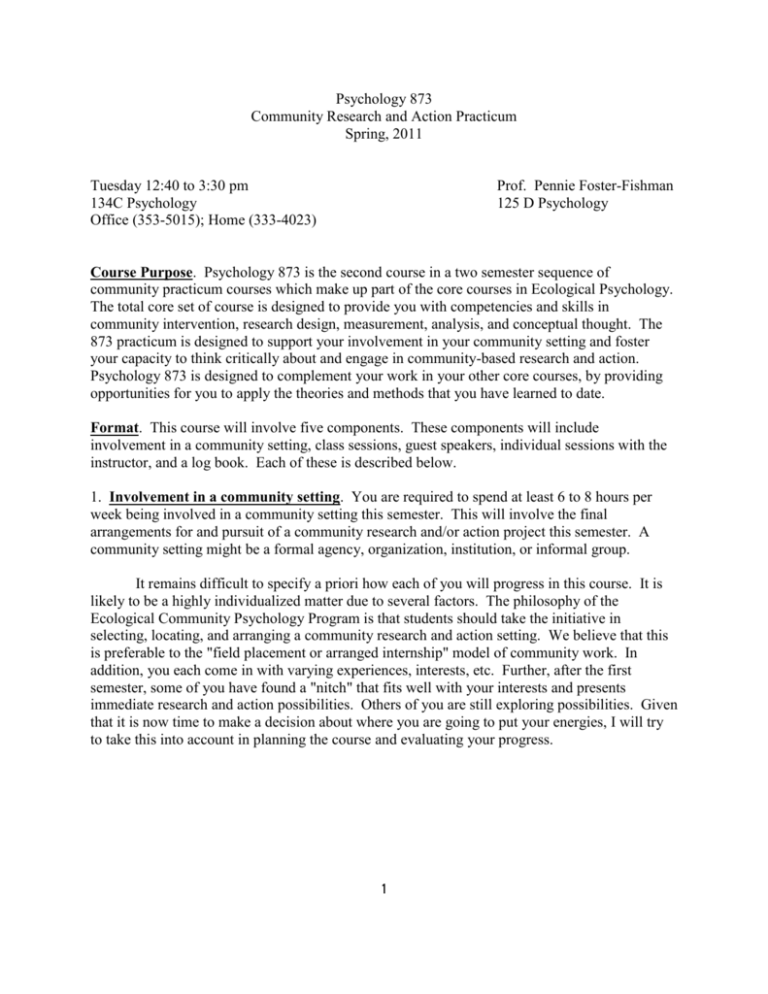
Psychology 873 Community Research and Action Practicum Spring, 2011 Tuesday 12:40 to 3:30 pm 134C Psychology Office (353-5015); Home (333-4023) Prof. Pennie Foster-Fishman 125 D Psychology Course Purpose. Psychology 873 is the second course in a two semester sequence of community practicum courses which make up part of the core courses in Ecological Psychology. The total core set of course is designed to provide you with competencies and skills in community intervention, research design, measurement, analysis, and conceptual thought. The 873 practicum is designed to support your involvement in your community setting and foster your capacity to think critically about and engage in community-based research and action. Psychology 873 is designed to complement your work in your other core courses, by providing opportunities for you to apply the theories and methods that you have learned to date. Format. This course will involve five components. These components will include involvement in a community setting, class sessions, guest speakers, individual sessions with the instructor, and a log book. Each of these is described below. 1. Involvement in a community setting. You are required to spend at least 6 to 8 hours per week being involved in a community setting this semester. This will involve the final arrangements for and pursuit of a community research and/or action project this semester. A community setting might be a formal agency, organization, institution, or informal group. It remains difficult to specify a priori how each of you will progress in this course. It is likely to be a highly individualized matter due to several factors. The philosophy of the Ecological Community Psychology Program is that students should take the initiative in selecting, locating, and arranging a community research and action setting. We believe that this is preferable to the "field placement or arranged internship" model of community work. In addition, you each come in with varying experiences, interests, etc. Further, after the first semester, some of you have found a "nitch" that fits well with your interests and presents immediate research and action possibilities. Others of you are still exploring possibilities. Given that it is now time to make a decision about where you are going to put your energies, I will try to take this into account in planning the course and evaluating your progress. 1 It is important to remember that you should co-design your project with the community setting and that the project should: 1) be value added for the community setting; and 2) provide you with an opportunity to develop your skills as a Community Psychologist. In the best of worlds, the work this semester will lead to opportunities for your Master’s or Dissertation research. Given the pressure to now "work something out" it is often easy to fall into a passive research or service role that appears at first glance to be expedient. You will need to provide me with a description of your practicum project. This description is due by February 2. We will discuss in class what you should include in this description. You are also required to provide me with a summary of your practicum work this semester. This summary is due May 2. We will discuss in class what you should include in this summary. 2. Class sessions. The majority of our classes are organized to promote reflective practice around your community work and the integration of theory into your practicum project. During each class session there are a few assigned readings, some initial questions to promote reflection and praxis, and assignments for Session Leaders. See the below course schedule for the specific content and assignments for these sessions. Overall, sessions will be focused on several objectives: Supervision and support of your community involvement. During each of these sessions, you will be asked to discuss your work in the community, share a description of your work with classmates, and problem solve next steps. As much as possible, we will work to design this part of our class as a peer-to-peer learning environment. To support that goal, you will be expected to give feedback to your peers on their work and provide any written materials to the class two days prior to our class time so we will all have a chance to provide you with feedback. Linking Action, Theory, and Research. Effective community psychologists engage in praxis, reflecting on their work in the community and using the best ideas, theories, and practices that can be found in the literature to inform their work. To help you develop these skills, we will be reading and applying some key articles to your work in the community. Be prepared to discuss the assigned readings and questions and their potential application to your practicum. In addition, at various points throughout the semester, I will provide you with opportunities to highlight/apply theory articles you read last semester. 3. Session Leader Assignments. Each of you are expected to lead two sessions in class. Session leaders are primarily responsible for creating useful summaries of the assigned articles and helping the class link ideas to other readings from either this class or other classes. Assignments for the summaries are listed on the below course schedule. We will select session leaders during the first class session. 2 4. Individual sessions. Four weeks during the semester we will schedule individual sessions with the instructor. This should allow more intense discussion of each of your community experiences. 5. Guest speaker panel. With direction from you, I will arrange for a guest speaker panel to expose you to the varying roles of graduates of our program. 6. Community log books. Your practicum log book will detail your community research and action work. It will be used in part to determine your grade for the practicum component of the course. You should pay close attention to your notes, and at least one entry each week should carefully describe your activities. This might include such items as notes about organizations, contact people, phone numbers, results of contacts, future plans, etc. I would like to continue the organization of your log book that was used in Psych. 992 in the fall. Your log book should be organized in the following manner and provide the details for each session. Section 1: Weekly Activities. A description of your activities in the last week, including their purpose and actions taken. Provide specifics on the work you did, how you participated in your organization, the role(s) you took on, who you met with, meetings you participated in. Include any organizations contacted, contact people, phone numbers, results of contacts, including what you have learned. This section should be an account of the events which happened during the week in your practicum. Section 2 : Subjective report. What were your impressions of what happened this week? To what extent is the setting meeting your needs and goals? To what extent are you meeting the settings objectives? How is your project proceeding? What changes needs to be made to your plans? I also expect you to use this section to talk about the application of the readings to your practicum experience. You can use this time to respond to the praxis questions I have provided and/or identify other issues you want to discuss. Section 3: Future plans. What are your plans for the next week? What do you plan to do? With whom? When? Is this leading where you want it to? Is it likely to match with your research needs? Given what you read this week, how might you apply these ideas next week in your practicum? Section 4: Troubleshooting. What problems/obstacles/frustrations did you encounter this week? Do you have plans for resolution? Do you need my assistance? Your log books are due to me at noon on Monday of each week. Please send them to me as a Word file and copy your classmates. 3 Grading Scheme. Grades will be determined in the following manner. 1. Log book 20% 2. Leading your topic 20% 3. Instructor evaluation of practicum 60% This component of the grade will be my subjective judgment of your community field work. It will involve an assessment of your effort in field work, your planfulness, your perseverance, and your class participation. It will also include attention to your efforts to practice praxis – integrating theory into your thinking and practice within your practicum. Grades will be given on a weekly basis and averaged over the quarter. I will give you feedback on your progress in this area during our individual sessions. 4 CLASS SCHEDULE Date Week Class Topic Assignments 1/11/2010 1 Class Organization 1/18/2010 2 Class Session: University/Community Collaboration Yolanda Suarez-Balcazar, Gary W. Harper and Rhonda Lewis. An interactive and contextual model of community-university collaborations for research and action. Health Education Behavior 2005; 32; 84 – 101. Harper, G.W., Bangi, A.K., Contreras, R., Pedraza, A., Tolliver, M., & Vess, L. (2004). Diverse phases of collaboration: working together to improve community based HIV interventions for adolescents. American Journal of Community Psychology, 33 (3/4), 193-204 Langhout, R.G., & Dworski-Riggs, D. (2010). Elucidating the Power in empowerment and the participation in participatory action research: A story about research team and elementary school change. American Journal of Community Psychology, 45, 215-230. Stufflemeam, D.L. (1999). Evaluation plans and operations checklist. www.wmich.edu/evalctr/checklists Practicing Praxis: 5 Date Week Class Topic Assignments What do these articles offer that could explain some of your practicum experiences last semester? What do these articles say about how to create an effective relationship/project with your practicum site? What might be some of the power boundaries you face in your setting/social issue domain? Which processes and skills do you think you will be good at? Which ones could you develop more? Session Leader: Create a checklist that you and your peers can use to guide your collaborative work in the community. 1/25 3 Class Session Ecological Theory in Action Community Ethics Ryerson-Espino, S. L. & Trickett, E. J. (2008). The spirit of ecological inquiry and intervention research reports: A heuristic elaboration. American Journal of Community Psychology, 42, 60-78. Elder, J.P., Lytle, L., et al. (2006). A description of the socialecological framework used in the trial of activity for adolescent girls (TAAG). Health Education Research, 1-11 American Evaluation Association, (2004) Guiding principles for evalulators. www.eval.org American Psychological Association (2002) Ethical principles of 6 Date Week Class Topic Assignments psychologists and code of conduct. APA: Washington, D. C. SCRA Principles (see http://www.scra27.org/about) Practicing Praxis Which ethical guidelines might pose the greatest challenges in your practicum site? Consider the questions listed on pg 12 of this syllabus to identify ways to more fully integrate ecological theory into your practicum project. What can you do now – in your entry process – to facilitate an ecological approach? What can you do with your project to facilitate an eological orientation Session Leader: Create a checklist that you and your peers can use that integrates the ethical principles across AEA, APA, & SCRA 2/1 4 Individual sessions 2/8 5 Class Session Logic Models and Theories of Change Community Action & Tools 7 Hernandez, M. & Hodges, S. (2006). Applying a Theory of Change Approach to Interagency Planning in Child Mental Health, American Journal of Community Psychology, 38, 165-173. Anderson, A.A The Community Builders Approach to Theory of Change: A Practical Guide to Theory Development. The Aspen Institute. www.theoryofchange.org Date Week Class Topic Assignments The Community Toolbox: http://ctb.ku.edu/en/ Practicing Praxis Review two sections of the Community Toolbox most linked to your practicum project. Use the table of contents to identify these sections. Be prepared to describe how you might use this info in your practicum. Find one project on the NREPP website or Promising Practices website that might benefit your practicum site or target population using the above internet sites. What are some core outcomes your site is trying to achieve? What strategies is it using to achieve these outcomes? Be prepared to work on developing a theory of change/logic model in class. ASSIGNMENT: Description of your practicum project is due. 2/15 6 Power and Oppression Hayward, D.R. (1998). De-Facing Power Polity, Vol. 31, No. 1., pp. 1-22. Davidson, H., Evans, S., Ganote, C., Henrickson, J., Jacobs-Priebe, L., Jones, D.L., Prilleltensky, I., & Riemer, M. (2006). Power and Action in Critical Theory Across Disciplines: Implications for Critical Community Psychology. American Journal of Community Psychology, 38, 35-49. 8 Date Week Class Topic Assignments Prilleltensky, I. (2003). Understanding, Resisting, and Overcoming Oppression: Toward Psychopolitical Validity American Journal of Community Psychology, Vol. 31, Nos. 1/2, March 2003 ( C° 2003) DOI: 10.1177/0959353509105620 Lykes, M.B., & Moane, G. (2009). Editors' Introduction: Whither Feminist Liberation Psychology? Critical Explorations of Feminist and Liberation Psychologies for a Globalizing World. Feminism Psychology 2009; 19; 283 Practicing Praxis 9 Which approach to power most fits with your assumptions? Why? Which approach to power best fits with your social issue or your practicum site? How might your practicum site or the approach to your social issue change if a different approach to power was adopted? How might these power frameworks help you understand your social issue and the process of social change? Pick one of the above articles and think about: 1) a research question you could ask in your practicum site using this framework; 2) three variables that you would measure using this framework. Date Week 2/22 7 Class Topic Assignments Class Session Theories for Community Research & Health Promotion Theory at a Glance: A Guide For Health Promotion Practice (Second Edition). U.S. Department Of Health And Human Services National Institutes of Health. http://www.cancer.gov/PDF/481f5d53-63df41bc-bfaf-5aa48ee1da4d/TAAG3.pdf Practicing Praxis What theories included in this manual do you find the staff/volunteers/clients at your practicum site using to explain either organizational or client behavior? Which theories might be helpful for your practicum site (for either your work or the setting members)? Why? Be prepared to describe in class how you could integrate one of these theories into your practicum project. For example, what intervention would you do, what research question might you include, etc? Session Leader. Create a brief summary guide of the key theories included in this manual. 3/1 8 Class Session Promoting Utilization Miller, R.L., & Shinn, M. (2005). Learning from communities: Overcoming difficulties in dissemination of prevention and promotion efforts. American Journal of Community Psychology, 35(3/4), 169-183. Durlak, J.A., & DuPres, E. P. (2008). Implementation Matters: A Review of Research on the Influence of Implementation on Program Outcomes and the Factors Affecting Implementation. American 10 Date Week Class Topic Assignments Journal of Community Psychology, 41, 327-350. Promising Practices Network: http://www.promisingpractices.net/ http://www.nrepp.samhsa.gov/find.asp Practicing Praxis Using ideas from the Miller/Shinn article and Durlak & Dupre’s article, assess the capacities of your practicum to implement an evidence based practice. What challenges might your site experience in trying to implement one of these programs or your practicum project? What challenges might you experience as you try to implement your practicum project? Session Leader. Create a checklist for you and your peers that includes recommendations for promoting the adoption and implementation of programs within community settings (using Miller & Shinn’s and Durlak & Dupre’s article). 3/15 9 Assessing Social Settings 11 Tseng, V. & Seidman, E. (2007). A systems framework for understanding social settings. American Journal of Community Date Week Class Topic Assignments Psychology, 39, 218-228. Practicing Praxis What social processes, resources, and organization of resources significantly influence the outcomes within your setting/target population? How might they (or how are they) influence the success of your practicum project? How could they be shifted to improve outcomes? 3/22 10 Utilization Ludema, J.D., Cooperrider, D.L., & Barrett, F.J. (2001). Appreciative inquiry: the power of the unconditional positive question. In P. Reason & H. Bradbury (Eds). Handbook of action research: Participative inquiry and practice. (pp. 190-199). London: Sage. Patton, M.W. (2002). Utilization-focused evaluation (u-fe) checklist www.wmich.edu/evalctr/checklists Mark, M.M., and Henry. G.T. (2004). The Mechanisms and Outcomes of Evaluation Influence. Evaluation 2004; 10; 35 – 57. Practicing Praxis According to the material you read for class this week, what have you done in your practicum that will help to promote the utilization of your work/findings? What have you done that might hinder utilization? What else can you do moving forward to promote utilization? 12 Date Week Class Topic Assignments Complete Patton’s checklist for yourself and your practicum. What does this checklist tell you? To what extent have you used the unconditional positive question in your interactions with your site? How might this approach shift your relationship and work in your practicum setting? Session Leader. Create a top 10 list of things a community psychologist can do to promote the utilization of findings within community sites. 3/29 11 Class Session Strategic Planning & Community Coalitions Watson-Thompson, J., Fawcett, S. B., & Schultz, J. A. (2008). Differential effects of strategic planning on community change in two urban neighborhood coalitions. American Journal of Community Psychology, 42, 25-38. Practicing Praxis How does your site engage in planning? Does it plan with community partners or on its own? What recommendations emerge from this article around how to improve your sites’ planning processes or your planning for your practicum project? 4/5 12 Guest Speaker Panel 4/12 13 Individual Sessions 4/19 14 Class Session Plagarism 13 Stolley, K., (2009) Avoiding plagiarism. OWL at Purdue. Owl. English.purdue.edu/owl/resource/589/01/ Date Week Class Topic Assignments Capacity Building & Systems Change The Writing Center, (2009). Plagiarism. University of N. Carolina. Unc.edu/depts./wcweb Bond, L., Glover, S., Godfrey, C., Butler, H., Patton, G.C. (2001). Building capacity for systems-level change in schools: Lessons from the Gatehouse Project, Health Education & Behavior, 28(3), 368-383. Practicing Praxis Does your practicum site have the capacity for systems-level change? Why or why not? How could you build your site’s capacity for system-level change? How would capacity building in your site need to differ from that described in the article? 4/26 15 Class Session Understanding Help -Seeking Behaviors Liang, B., Goodman, L., Tummala-Narra, P., & Weintraub, S. (2005). A theoretical framework for understanding help-seeking processes among survivors of intimate partner violence. American Journal of Community Psychology 36(1/2), 71-84. Practicing Praxis To what extent do the processes of defining the problem, deciding to seek help, and selecting a source of support explain the access to services processes for your target population? What individual, interpersonal, and sociocultural factors might 14 Date Week Class Topic Assignments influence that decision-making for your target population? 5/2 16 Individual Feedback Sessions 15 Final practicum report due Questions to guide your Integration of Ecological Theory into your Practice Adopted from Ryerson-Espino, S. L. & Trickett, E. J. (2008). What is the environmental press of your context? • What are the demand characteristics, norms, values, historical and current processes and resources are play? What are the developmental histories of local change efforts? • What challenges have communities identified in the past? How have communities attended to these challenges? How have communities partnered with others to address challenges? What experiences and actions resulted from such partnership? • What are communities’ current and future action priorities, debates and/or struggles? Appreciating diversity • What are the diversity issues within your practicum site that you should be aware of and attend to? Assessment of Ecological levels of theoretical framework, intervention components and analyses What levels are you theories, interventions, and data collection efforts? Responsiveness to the community context • How does your proposed project attend to the community context (e.g., the environmental press)? • Is there community member consensus over the planned project? How might you support community decision making processes and commitment to intervention activities? What kind of feedback is promised and delivered to participants and community settings? • How will you negotiate the closure of the relationship with setting members? • How will you prepare yourself, participants and community of concern for closure? What is the purpose and nature of participation? •How will you involve community members in conceptualization, planning, implementation of intervention activities, evaluation, dissemination of findings, & post intervention activities/sustainability efforts? 16
